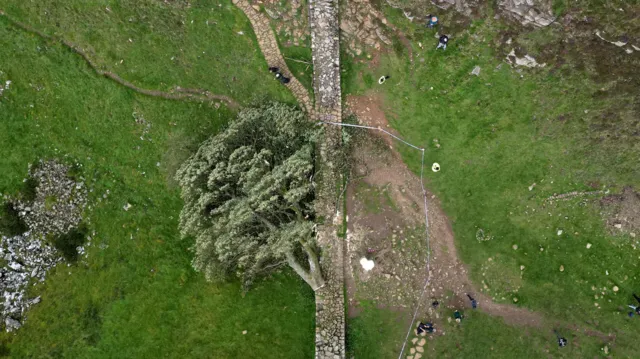Wrongly Accused: Walter Renwick’s Ordeal After Sycamore Gap Tree Felling
The felling of the iconic Sycamore Gap tree sent shockwaves across the nation, but for Walter Renwick, the aftermath brought a torrent of false accusations and relentless online abuse. Within hours of the destruction of the beloved landmark, Renwick, a former lumberjack with a background in forestry, found himself at the center of a maelstrom. Amateur online investigators, fueled by speculation, zeroed in on him, convinced his skills and a perceived motive made him the culprit. The narrative quickly painted him as the perpetrator, despite a critical flaw in the theory: it simply wasn’t him.

The swiftness with which Renwick was targeted underscored the dangerous speed of misinformation in the digital age. National newspapers featured photographs of police searching his Northumberland home and seizing a chainsaw, fueling the public frenzy. “It was heartbreaking,” Renwick shared, describing the pervasive atmosphere of suspicion. “There were police everywhere, drones flying around the valley, divers in the lake. They were 100% certain I’d done it.” The accusations followed him into his daily life, with people in local towns like Haltwhistle and Hexham whispering and pointing. “Every time I went shopping… people were nudging each other and saying ‘that’s him that cut the tree down’,” he recounted. The pressure became so intense that Renwick resorted to wearing a disguise, a “Rod Stewart wig,” in a desperate, albeit somewhat comical, attempt to evade recognition.
Adding to his profound distress, Renwick had recently been evicted from Plankey Mill Farm, near Bardon Mill. This was not just any farm; it was a place deeply intertwined with his family history, where his parents and grandparents had farmed for decades. The tenancy, once held by his grandfather and father, had not transferred to him. “I’d just lost everything I had – my cows, my sheep, my parents’ stuff. I’d lost my home and then this,” he said, linking the felling accusations to his personal devastation. Jesuits in Britain, the landowners, stated that the eviction in 2021 was a “difficult decision” made after “many attempts to engage with him,” citing “serious breaches of his tenancy, including unauthorised camping on the land, damage to the farmhouse and repeated refusal to allow inspections.” Renwick admitted to running a campsite and acknowledged concerns about anti-social behavior, alleging that the National Trust, owner of the adjacent land and Sycamore Gap, had lodged a complaint.

Meanwhile, a separate investigation led to the arrest of a 16-year-old boy on the same day Renwick was taken into custody. Neighbors in Haltwhistle reported seeing a significant police presence and the teenager being taken away in a car. Journalist Kevin Donald observed that locals were initially reluctant to identify the boy, seemingly wanting to protect him. However, social media quickly became a platform for speculation, with the teenager’s name and photograph, reportedly showing him with a chainsaw and in “lumberjack gear,” being widely circulated. This shift from disbelief (“a kid couldn’t do this”) to suspicion (“maybe that kid could”) highlights the perilous nature of online judgment.
The situation escalated dramatically as the teenager faced disturbing online abuse, including references to a deceased relative. Donald described it as “trial by social media,” noting the confusion that arose, with some mistakenly believing Renwick and the arrested teenager were related. “It was all over the place that they’d arrested Walter and his grandson, but it turned out they didn’t even know each other,” he added.
In November, the police announced that the teenager would face no further action. A month later, the same announcement was made regarding Walter Renwick. By this point, Daniel Graham, 39, and Adam Carruthers, 32, both from Cumbria, had been arrested and charged. The police acknowledged the “strength of feeling” surrounding the felling and emphasized their “meticulous and proportionate investigation,” attributing the successful prosecution to the “unwavering commitment” of their team.

On May 9th, a jury at Newcastle Crown Court unanimously convicted Graham and Carruthers of two counts of criminal damage. Reflecting on the ordeal, Renwick expressed his bewilderment: “I just keep asking myself why they did it. Was it just attention seeking? I don’t know what it was but, for me at least, it’s over.” While the felling of the tree was a significant event, Renwick stated that losing his farm was the more profound personal loss. Jesuits in Britain clarified that Renwick’s father had relinquished the tenancy in 2008, and while Walter did not legally qualify to succeed him, he was granted an extended lease well beyond their obligation. They asserted that Renwick was “fully aware” of the process and had numerous opportunities to discuss alternatives, concluding, “We sincerely wish him well as he moves forward.”

The case serves as a stark reminder of the human cost of public speculation and the importance of due process, even as digital platforms amplify narratives at unprecedented speed. Renwick’s experience highlights the devastating consequences of false accusations, particularly when coupled with personal hardship.



Post Comment